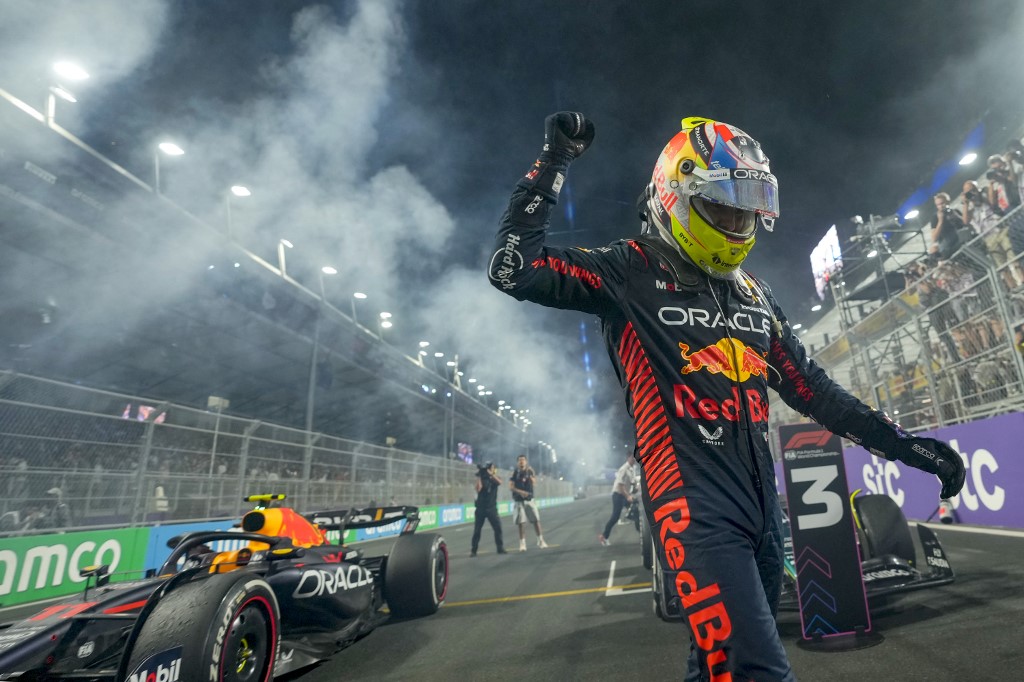The Saudi Arabian Grand Prix on Sunday was another triumph for Red Bull as Sergio Perez and Max Verstappen took a third successive 1-2 but there were shafts of light also for Aston Martin and Mercedes.
AFP Sport looks at three lessons learned from the second race of the season under the floodlights at the Jeddah Street Circuit:
Red Bulls have wings

Red Bull Racing’s Mexican driver Sergio Perez celebrates after winning the Saudi Arabia Formula One Grand Prix at the Jeddah Corniche Circuit in Jeddah on March 19, 2023. (Photo by Luca Bruno / POOL / AFP)
This was less a lesson learned than a lesson confirmed: the Red Bulls are on another planet, having lapped a second a lap faster than all the rest.
Their performance was brutal, relentless and pretty much wrapped up the title race. It is not a question of if a Red Bull driver wins the championship but when and which one.
Perez won the race with a tremendous drive but how good was defending double world champion Max Verstappen who climbed from 15th on the grid, following a driveshaft failure in qualifying, to second? The ease with which he sliced through the field was astonishing and pitiful in equal measure.
The interest this season will come from the battle within the team.
Verstappen’s single-minded approach to accumulating wins and titles will not often allow Perez any hope except for reliability problems – a threat to his hegemony that the 25-year-old Dutchman has already recognized.
“I’m not happy because I’m not here to be second,” said Verstappen after the race in Jeddah.
“When you’re fighting for a championship and especially when it looks like it’s just between two cars, you have to make sure that also the two cars are reliable.”
Perez showed again his talent as a ‘street fighter’ but he will have to raise his game on other tracks and challenge Verstappen’s alpha dog tendency within the team if he wants to become Mexico’s first world champion.
Alonso is box office
Aston Martin’s Fernando Alonso drinks champagne on the podium after finishing third place in the Saudi Arabian Grand Prix. REUTERS/Rula Rouhana
Like an aging matinee idol, Fernando Alonso demonstrated once again that he knows all the tricks for both thrilling and charming an audience.
When the Spaniard, now 41, won the second of his two titles in 2006 he looked set for a lengthy time at the top. But along came Lewis Hamilton and Sebastian Vettel and things did not go quite to script.
Alonso left Formula One, spread his wings in Indycar and endurance, twice winning the Le Mans 24 Hours. But the brightest stars need the biggest stages and Alonso returned to F1, older and wiser.
His move to Aston Martin has coincided with a superb improvement in performance from the car and he looks determined to enjoy an Indian summer.
Starting second, he led briefly before the Red Bull power kicked in. When news came through that he had lost his third place because of an improper pit-stop while serving a penalty, he was sanguine.
“I’m not too upset,” he said. “It was good and it doesn’t hurt much. I was on the podium, I took the pictures, I got the trophy. I celebrated with the champagne.”
Alonso got his podium back, though, the 100th of his career, and, if he cannot compete with the Red Bulls, he looks certain to be vying to be the Best of the Rest. He also took third in Bahrain.
A first Grand Prix win since Spain 10 years ago is not unthinkable – it would be hugely popular in the stalls.
Mercedes has a pulse
Mercedes’ British driver George Russell competes during the Saudi Arabia Formula One Grand Prix at the Jeddah Corniche Circuit in Jeddah on March 19, 2023. (Photo by Giuseppe CACACE / AFP)
Reports of the demise of Mercedes may have been exaggerated. On the high-speed power-friendly Jeddah track, there were distinct signs of life as Mercedes left Ferrari floundering and proved to be the third fastest team.
George Russell’s run to fourth and seven-time champion Hamilton’s fifth place finish were more than they expected and suggested that their much-lambasted car can continue to fight for points and podiums, if not challenge Red Bull.
It was a result nobody expected following the rows, recriminations and ‘noise’ in the build-up to the race.
In part that may be due to Ferrari’s inexplicable slump but Mercedes will not worry overly about the opposition.
“There’s lots to work on but we can take the positives,” said Hamilton.
The evidence of those positives, if they are in fact there, will be on display when the teams head to Melbourne for the Australian GP on April 2.

